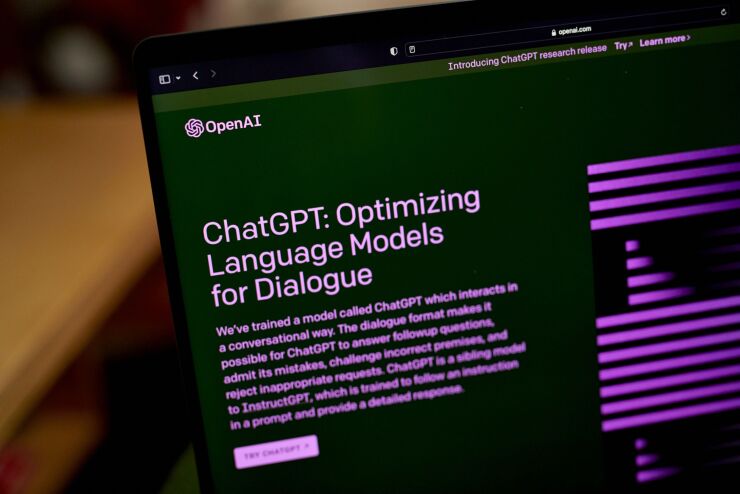
A fun drinking game at the Finovate fintech conference this week in New York City might have been to make people down a shot of vodka every time someone said "artificial intelligence." The audience would have been hammered well before lunchtime on day one.
The term came up in about half of the 70 demonstrations. Tomas Chamorro-Premuzic, author of a book called "I, Human: AI, Automation, and the Quest to Reclaim What Makes Us Unique," talked about how AI can create as well as kill jobs and about the need to make AI models that are open-minded.
Bankers at the event were measured in their views on advanced AI, especially the
"Something like an AI [chatbot] could help them get to a point where the shame has been absolved and then they're able to come in and really have more in-depth conversations," she said.
Josh Williams, chief banking officer and head of partnerships at Seattle Bank, said he has personally subscribed to the $20-a-month premium ChatGPT Plus.
"I do think it's amazing, and I do think incorporating it into
Large language models could be used to provide financial information to consumers who can't afford a personal wealth advisor, Williams said.
"I think it does have some serious potential there," he said.
Citizens Financial Group, the $223.1 billion-asset bank based in Providence, Rhode Island, has been investing in AI for some time, according to Jo Wyper, head of digital and operations for commercial banking at Citizens.
"We are exploring advanced AI and large language models currently," she said. "There are many use cases, and we believe that generative AI has the ability in the industry to help anticipate and predict client needs in a sophisticated way."
Citizens Financial plans to launch a virtual assistant, Digital Butler, on its commercial banking app next quarter. It
But bankers have reservations about generative AI.
"As you know, in banking, if you get anything wrong for the consumer, the stakes are too high," Seattle Bank's Williams said. "Our view is, it's interesting but a long way" from being something the bank would put in front of customers.
Castilla of Citizens Bank of Edmond said the use of generative AI in communicating with customers carries a danger of eroding trust. "The digital trust component is so critical," she said.
"When we talk about AI, it's about, how does AI enhance the experience, not replace the experience," she said. "And how do you make it where that trust is enhanced versus someone potentially feeling betrayed that they were talking to AI versus talking to one of us? How do you keep that genuineness while leveraging the AI?"
The bank is not using generative AI yet but has explored different opportunities, Castilla said.
"Again, how does that level us up?" she said.
She also pointed to the need for personality and differentiation in a bank.
"How do we think AI could help us do things better or faster, but not make it as ubiquitous that we're all the same?" she said. "We need to have that personality that often only comes from the humanity of a person engaging."
Humans can also anticipate stress, something a bot may not be equipped to do. "I sit behind the teller line and can see the stress in people's eyes," Castilla said.
Trust and regulatory issues are the biggest challenges to AI in banks, noted Aaron McPherson, principal analyst at AFM Consulting.
"One conference attendee I spoke with who deals with government relations expressed confidence that regulators would severely restrict bank usage of the newer generation of large language model AI systems, for reasons of privacy and security," he said. "Banks may hesitate to make big investments in large language models when their regulatory outlook is so negative."
When it comes to trust, large language models can have an "uncanny valley" effect, said McPherson, referring to a hypothesis that entities appearing almost human risk eliciting cold, eerie feelings in people.
"They appear human until they make a mistake, at which point the user can be profoundly unsettled," he said. "I think some premium customers will demand human interaction." Many banks are trying to set up the right mix of AI and human interaction, "with the humans taking over for more complex or sensitive interactions," he said.
Answers that used to take employees 15 minutes to find, they can now obtain in seconds using the enterprise version of ChatGPT.
"Since banks see themselves as being in a relationship business, they are unlikely to shift completely to an AI-based customer service model," McPherson said. "And I am sure there are customers who will find it more natural to engage with a traditional user interface, rather than typing questions into a chat window."
Bankers have long been willing to let others take the lead when it comes to any new technology, observed Jim Perry, senior strategist at Market Insights. "The cost of implementation, combined with the concern over possible AI error, are causing many bankers to fall into a wait-and-see pattern."
He worries, though, that bank leaders fail to see how quickly AI solutions are evolving.
"Bankers should be diligent, but they shouldn't let concern push AI adoption too far down their list of priorities," Perry said.






